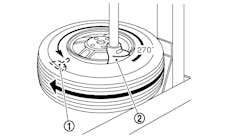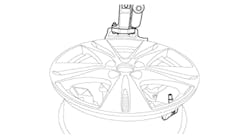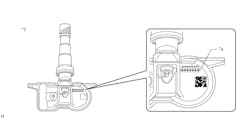If you own a tire store east of the Mississippi River, one of your competitors likely is owned by Monro Muffler Brake Inc. With 1,010 stores in 25 states, Monro is working to dominate the eastern half of the United States, and the company’s Executive Chairman Robert Gross says there’s plenty of opportunity to grow even more.
“We have 1,000 (service and tire) stores now, and we could get almost three times bigger and not leave our current footprint,” Gross told attendees of the ICR XChange Conference this week in Orlando, Fla. It’s one of the largest investment conferences of the year and features presentations from more than 150 public and private companies. This year’s lineup included everything from Krispy Kreme Doughnuts Inc. to Tupperware Brands Corp.
Right now, Monro’s split between service and tire stores is fairly even – 542 service stores and 468 tire stores, as of the Oct. 19, 2014, data Gross shared during his presentation. If the company was to nearly triple in size and maintain a similar ratio of service and tire stores, Monro easily would take the top spot on the MTD 100 and eclipse Discount Tire as the largest independent tire dealer in the U.S.
Acquisitions have become Monro’s big story. In the last 13 years Monro has completed 30 acquisitions including 508 stores and $620 million in revenue. And with each one Gross said the company creates more market dominance and pricing power, while also expanding the pool of future acquisition candidates.
Gross said the company could have up to 1,300 tire stores and an equal number of service stores in its current territory, which covers the entire East Coast, from Maine to Florida, and extends west to Missouri. And Monro has plenty of money to make those transactions, including access to a $250 million credit line with a 1% interest rate.
If you think the tariffs might hinder Monro’s growth, think again.
“Anything that makes things more expensive, or more complicated like the tariff, moves the business in our favor,” he said.
On top of the 12.03% tariff that will be assessed on most Chinese-imported passenger and light truck tires, the tire industry is awaiting word from the United States Department of Commerce if anti-dumping duties also will be assessed on those same imports. Gross anticipates the anti-dumping duty will add another 35%.
“For us, that’s a good thing,” Gross said, referring to the tire tariff. “Number one, it will reverse the deflationary pressure and now produce better comps without negatively impacting units, in our opinion. But more importantly it creates a significant spread between us who buys three million tires a year and the guys we’re either trying to buy, or our competition.
“We will see in total a 5% to 10% cost increase on our tires. Our competitors that we will be buying or competing against will see a 15% to 20% cost increase in their tires,” Gross said. “So it gives us flexibility either to raise prices along with them and make money, or be more promotional (and) better priced versus them and still be able to make some money.”
Monro’s focus is to increase its density in every market it serves. At the very least, Gross said the company wants two brands in every market – a tire brand and a service brand. Monro does business under a variety of names, including Monro Muffler Brake and Service, Mr. Tire, Tread Quarters, Autotire, Discount Tires, Tire Warehouse, Tire Barn and Ken Towery’s Tire and Auto Care.
The company isn’t concerned about a national footprint with one name brand, Gross says. It operates the stores it acquires under the names local customers already know and trust. Having multiple shops and brands in one market gives Monro more sales and a bigger share of that market. It also allows the company to leverage distribution and advertising dollars.
“Forty-five percent of our customers just don’t want to get ripped off. Forty percent just want us to do the job right. Fifteen percent are price shoppers. For them we have a best price guarantee for up to 30 days after,” Gross said. “But if you think of exceeding customers’ expectations, effectively we do that by not stealing from them and not screwing up their car, so a pretty low bar.”


